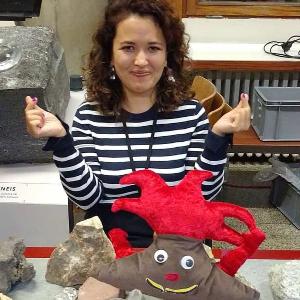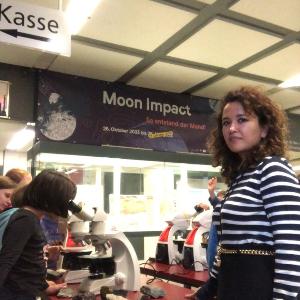DAAD prize for Afghan doctoral candidate at LMU
12 Dec 2024
Geologist Sima Akrami receives the DAAD prize for outstanding achievements by international students at German universities.
12 Dec 2024
Geologist Sima Akrami receives the DAAD prize for outstanding achievements by international students at German universities.

Sima Akrami organizes workshops for children at the Museum Mineralogia, among other things. | © private
As an Afghani national in Iran, life was not always easy for Sima Akrami. Yet despite suffering discrimination because of her ethnic origins and her gender, she battled her way up to the university in Tehran. But when the Taliban came to power, she was unable to continue writing her dissertation. A scholarship from the German Academic Exchange Service (DAAD) paved the way for her to resume her doctoral research at LMU Munich. Now, Ms. Akrami has received the DAAD award for outstanding achievements and voluntary commitment from LMU Vice President Professor Francesca Biagini.
Sima Akrami’s life story reflects the geopolitical developments of recent decades. In Afghanistan, her parents were discriminated against as a minority, which is why they fled to Iran in the 1980s. Even here, however, Afghanis were not particularly welcome, so they never received a permanent residence permit. When Sima was born in Tehran in 1987, she too was therefore given Afghani citizenship. Despite adverse circumstances, she attended school in Iran. “But people said so many bad things about me and my compatriots,” she says sadly.
The young girl never gave up, however. Inquisitive and hard-working, she consistently achieved good grades. Her teachers recognized her potential and encouraged her despite her Afghan heritage. Her parents too supported her and her brothers, enabling them to get a solid education even though money was tight. That could certainly not be taken for granted: “Most of my girlfriends were already married at 15 and, as women, had few rights,” she recalls. Her father in particular did everything he could so that she was able to study. “One day,” he promised her, “you will be a professor.”
The road to this goal was a rough and stony one, though. When she was 16, the Iranian government suddenly prohibited Afghani nationals from going to school. “That came as a shock to me,” she says. She and her siblings had to wait a whole year for this law to be repealed. However, she now had to pay heavy tuition fees in order to go back to school, so she had to go to work alongside her tuition. As an Afghani without a work permit, this too was difficult. Interpreting assignments kept her head above water, however, and at the age of 20, she finally made it to the Shahid Beheshti University of Tehran.
Here, she opted to study geology – although many people told her this was not a subject for women. “Fortunately, I had a professor who supported me in my decision,” she tells us. In 2011, she earned her bachelor’s degree with flying colors. A master’s degree followed in 2014, after which she took up a post in thin-section petrography, a geoscientific method of examining rocks and minerals. And it was this job that gave her the idea for her dissertation: She wanted to scientifically investigate ore stone specimens from Afghanistan – and, by traveling there, to get to know her home better.
Just as the geologist was making a start on her doctorate, the Taliban came to power in Afghanistan – another shock for the would-be researcher. For one thing, a new “virtue and blasphemy law” made the country an unsafe place for women such as her. On the other hand, she had already conducted a year’s worth of research on her topic and was in touch with a mining company. The Taliban’s power grab put an end to all that: Now aged 35, Sima’s plans were in ruins. Once again, however, she refused to give up: “I wanted to carry on learning and working,” she says, with palpable determination.
While conducting online research for her doctoral thesis in 2022, the native of Tehran came across the Faculty of Geosciences at LMU. She contacted Dr. Malte Junge and told him about her predicament. The lecturer in crystallography promised to take up her cause: “That gave me a lot of hope,” she affirms. A little later, the DAAD had given her a “Bridge Scholarship” for students who are unable to return to their home country. She moved to Munich, quickly learned German and is now studying rock samples from Albania, Cyprus and Türkiye, instead of from Afghanistan. And before the year was out, she was able to present a scientific poster on her dissertation at the German-language GeoMinKöln convention.

Sima Akrami organizes exhibitions at the Museum Mineralogia. | © private
The doctoral candidate really enjoys living in Germany. “Everyone is nice to me, they all smile at me,” she says. That is something to which was unaccustomed in Iran. She was also positively surprised by the fact that young and old alike speak English here. To pay her way in Munich, she complements her doctoral research by working at the Museum Mineralogia. After starting out as a research assistant, she has had regular employment here since September, organizing permanent and special exhibitions and leading workshops for children and young people. “It is great that there are always events on offer for youngsters. I would have loved to see that in Iran as well.”
To give something back in return for all that she has received, Sima Akrami does voluntary work helping out with refugees in Erding. In particular, she provides Farsi translations in the context of medical examinations. To this end, she specially acquired a volunteer lay interpreter certificate at the Munich Institute of Languages and Interpreting (SDI). So that she could also interpret during visits to local government agencies, she also completed a translation course at the Erding district administration office. Whenever someone is in need, her phone rings. Does it get too much for her at times? A little bit, she admits: “But when I help people and they smile at me, I just have to keep going,” she says with a laugh.
For her dedication, Sima has now won the DAAD prize for outstanding achievements by international students at German universities. Endowed with 1,000 euros, the prize will be handed to her on 12 December 2024 at the International Office overseen by Professor Francesca Biagini, Vice President for International Affairs and Diversity at LMU, who will be accompanied by a representative of DAAD. On behalf of all international students, the accolade underscores what an asset they are to the university landscape. It should also help them build bridges to the academic, economic and political communities.
The award is a huge source of motivation to help out not just at the university, but also in society.Sima Akrami
For Sima Akrami, news of the award came as a complete surprise. “But it is a huge source of motivation to help out not just at the university, but also in society.” She will use the money to fund her doctoral research. The 37-year-old says she would also like to explicitly thank her doctoral supervisors PD Dr. Junge and PD Dr. Melanie Kaliwoda, as well as Professor Wolfgang W. Schmahl, the DAAD and LMU. And, of course, her family. The news of her award prompted tears of joy back in Iran. And for a moment, all the hardships – and even the Taliban – were forgotten. “Papa,” she said in one video call, “you were right: I’m going to be a professor.”